Unit 12 Life is full of the unexpected. Section A (Grammar Focus~4c)课件(共22张PPT)
文档属性
| 名称 | Unit 12 Life is full of the unexpected. Section A (Grammar Focus~4c)课件(共22张PPT) | 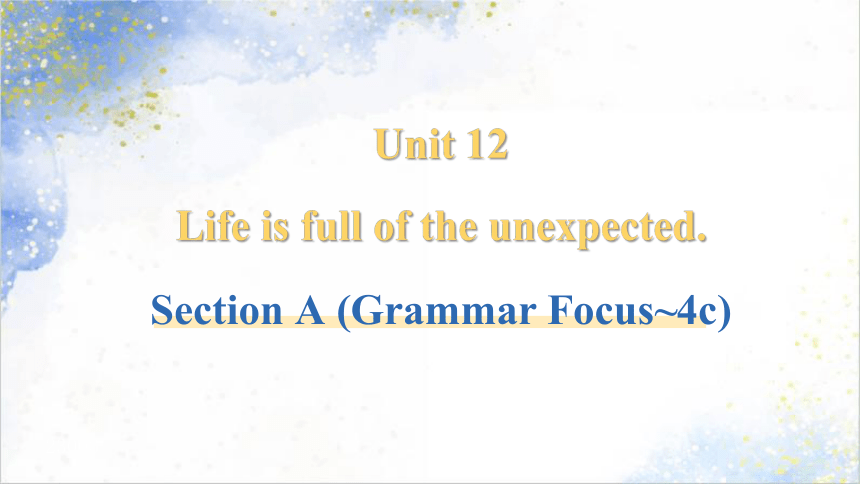 | |
| 格式 | pptx | ||
| 文件大小 | 1.5MB | ||
| 资源类型 | 教案 | ||
| 版本资源 | 人教新目标(Go for it)版 | ||
| 科目 | 英语 | ||
| 更新时间 | 2024-11-23 11:54:07 | ||
图片预览


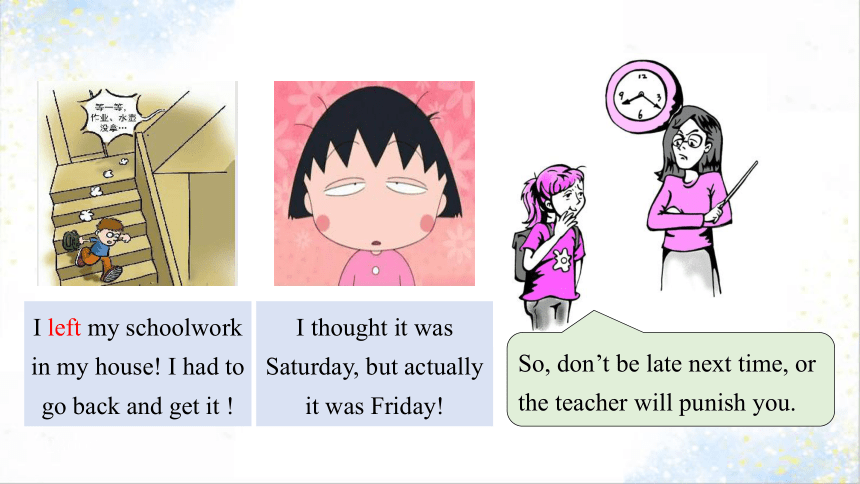
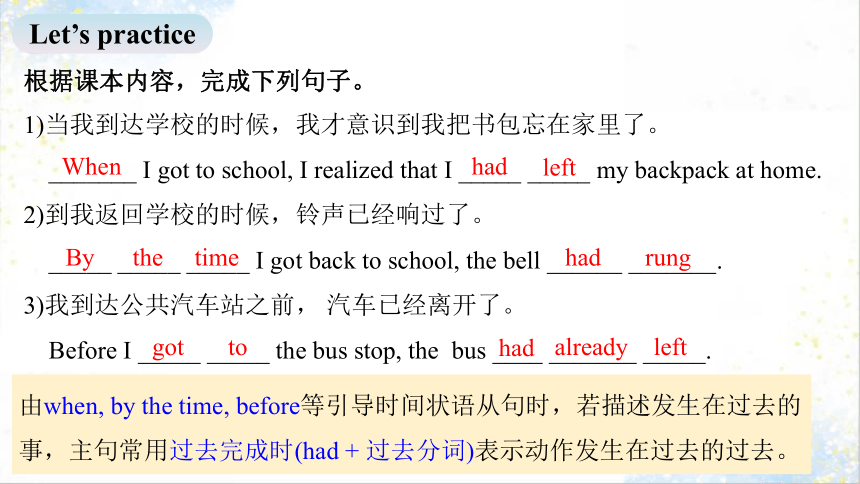
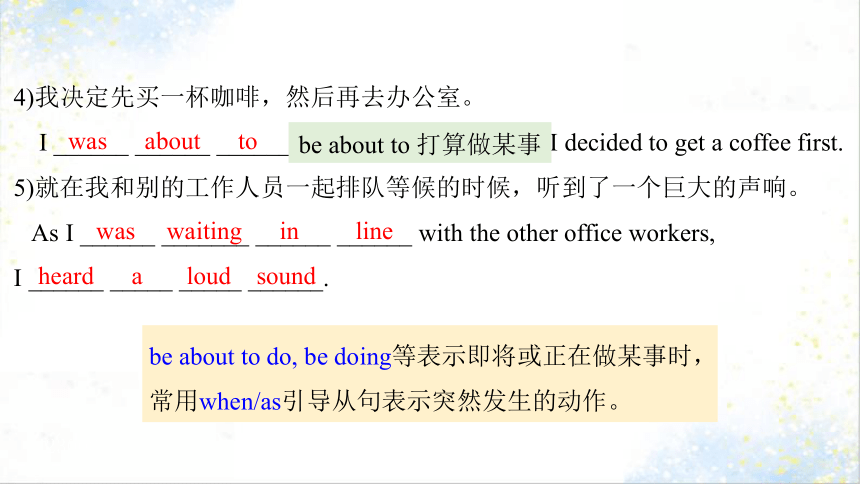
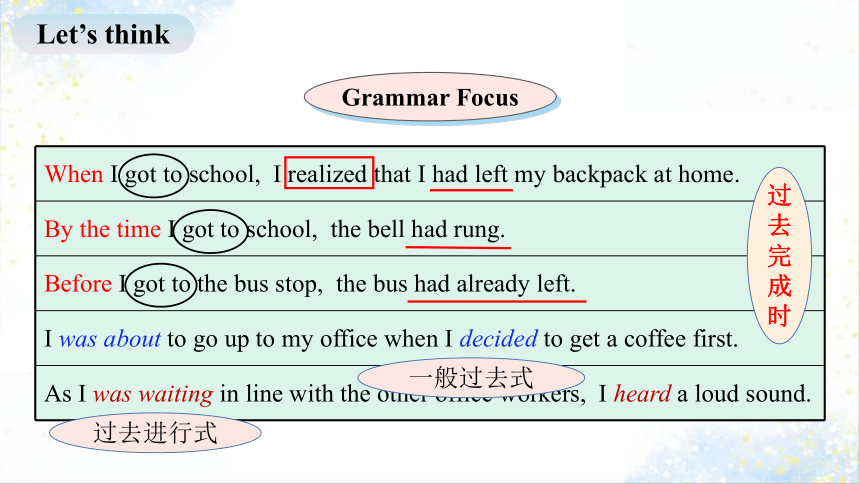

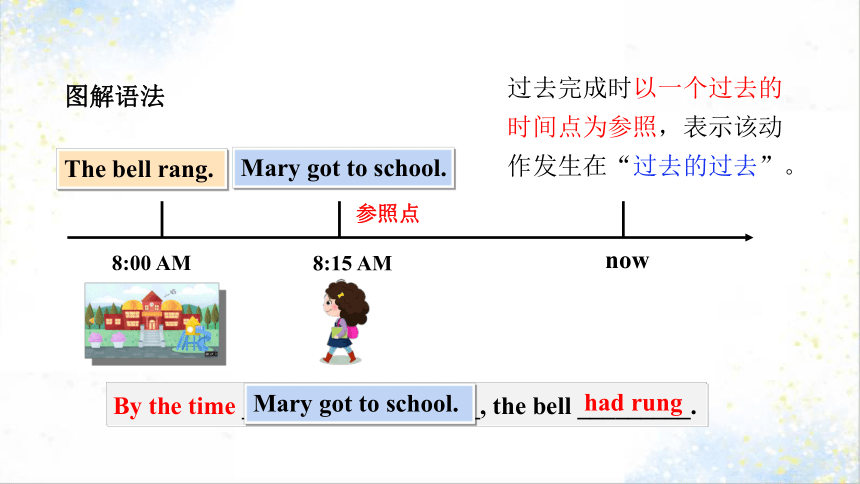
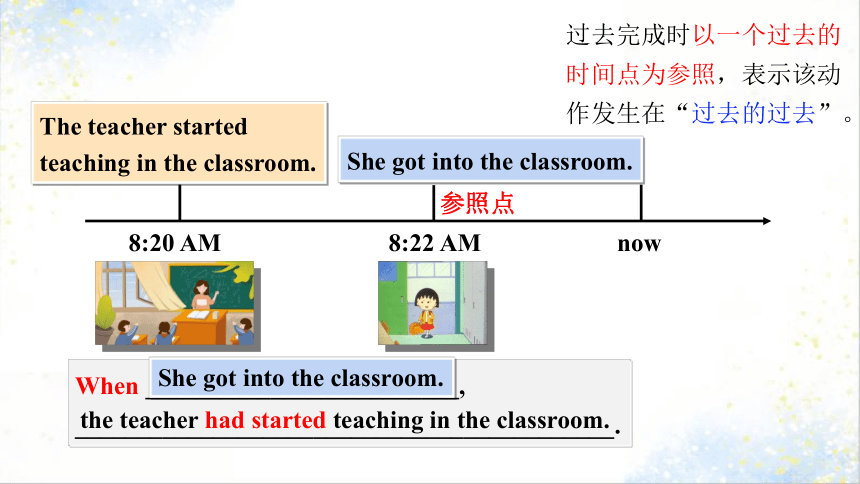
文档简介
(共22张PPT)
Unit 12
Life is full of the unexpected.
Section A (Grammar Focus~4c)
Do you ever be late for school
What happened
I overslept.
The bus was too crowded to get on.
There was an accident when I was on my way to school.
I forgot to take my schoolbag!
Free talk
I left my schoolwork in my house! I had to go back and get it !
I thought it was Saturday, but actually it was Friday!
So, don’t be late next time, or the teacher will punish you.
根据课本内容,完成下列句子。
1)当我到达学校的时候,我才意识到我把书包忘在家里了。
_______ I got to school, I realized that I _____ _____ my backpack at home.
2)到我返回学校的时候,铃声已经响过了。
_____ _____ _____ I got back to school, the bell ______ _______.
3)我到达公共汽车站之前, 汽车已经离开了。
Before I _____ _____ the bus stop, the bus ____ _______ _____.
When
had
left
By the time
had rung
got to
had
already left
由when, by the time, before等引导时间状语从句时,若描述发生在过去的事,主句常用过去完成时(had + 过去分词)表示动作发生在过去的过去。
Let’s practice
4)我决定先买一杯咖啡,然后再去办公室。
I ______ ______ ______ go up to my office when I decided to get a coffee first.
5)就在我和别的工作人员一起排队等候的时候,听到了一个巨大的声响。
As I ______ _______ ______ ______ with the other office workers,
I ______ _____ _____ ______.
was about to
was waiting in line
heard a loud sound
be about to 打算做某事
be about to do, be doing等表示即将或正在做某事时,常用when/as引导从句表示突然发生的动作。
Grammar Focus
When I got to school, I realized that I had left my backpack at home.
By the time I got to school, the bell had rung.
Before I got to the bus stop, the bus had already left.
I was about to go up to my office when I decided to get a coffee first.
As I was waiting in line with the other office workers, I heard a loud sound.
过
去
完
成
时
一般过去式
过去进行式
Let’s think
1. 过去完成时的构成:_____+___________________________
2. 过去完成时表示:
__________________________________
3. 过去完成时常与 ___________________________等引导的时间状语连用。
had
动词的过去分词形式(V-ed)
when, before, by the time, by
过去某一时刻或动作之前已经发生或完成的动作。
语法归纳
Past Perfect Tense现在完成时
过去的过去
过去某时
现在
将来
过去完成时
now
The bell rang.
8:00 AM
8:15 AM
By the time ___________________, the bell _________.
had rung
Mary got to school.
参照点
过去完成时以一个过去的
时间点为参照,表示该动
作发生在“过去的过去”。
Mary got to school.
图解语法
now
The teacher started teaching in the classroom.
8:20 AM
8:22 AM
When _________________________, ___________________________________________.
the teacher had started teaching in the classroom.
She got into the classroom.
She got into the classroom.
过去完成时以一个过去的
时间点为参照,表示该动
作发生在“过去的过去”。
参照点
now
The bus left.
5:20 PM
5:21 AM
Before __________________________, ______________________________.
the bus had already left.
She arrived at the bus stop.
过去完成时以一个过去的
时间点为参照,表示该动
作发生在“过去的过去”。
参照点
She arrived at the bus stop.
过去完成时的具体用法:
(1)表示一动作或状态在过去某一时间或动作之前已经完成,即发生在“过去的过去”。这个过去的时间可以用by, before等介词短语或者一个时间状语从句来表示。
例:我醒来时,雨已经停了。
When I woke up, it had stopped raining.
(2)表示某一动作或状态在过去某时之前已经开始,一直延续到这一过去的时间。常用表延续的时间状语如by the end of+过去的时间点, by the time +从句等。
例:到去年年底,她已经在这家工厂工作20年了。
By the end of last year, she had worked in the factory for twenty years.
过去完成时的判断依据:
(1)由时间状语来判定:
① by+过去的时间点(从句用by+时间点,主句用现在完成时。)
例:到昨天9点钟时,她已经读完了这本书。
She had finished reading the book by 9 o’clock yesterday.
② by the end of+过去的时间点 “到……结束时”(+过去的时间点,主句用过去完成时)
例:到上个月月底,我们已经完成了所有工作。
We had completed all the work by the end of last month.
注意:by the end of+将来的时间点, 主句用将来完成时;
By the end of next month, I will have finished my new book.
到下个月结束时我将要完成我的新书。
③ by the time “到……时候(为止)”,是一个介词短语,在句中常起到连词的作用,引导时间状语从句。
如果从句中的谓语动词是一般过去式,那么主句的谓语动词通常用过去完成时,表示“截止到从句动作发生时,主句动作已经完成,即过去的过去”。
例:By the time you came back, I had finished this book.
你回来时我已经把这本书看完了。
注意:如果从句中的谓语动词为一般现在时或现在完成时,那么从句中的谓语动词常用将来完成时,表示“截止到将来的某一时刻为止,主句动作将已完成。”
By the time I graduate next year, I will have lived here for five years. 到明年毕业时,我将已经在这待了五年了。
①含有宾语从句的复合句中:当主句为一般过去时,且从句的动作先于主句的动作发生时,从句要用过去完成时。如在told,said,knew,heard,thought等动词后的宾语从句中。
例:她说她以前已看过这部电影了。
She said that she had seen the film before.
(2)由“过去的过去”来判定
②含有状语从句的复合句中,主、从句的动作发生有先后关系,动作在前的要用过去完成时,动作在后的要用一般过去时。
例: 我到达车站时,火车已经离开了。
When I got to the station, the train had already left.
③表示意向的动词,如hope,wish,expect,think,intend,mean,suppose 等,用过去完成时表示“原本……,但未能……”。
例:我们本希望你能来,但你没来。
We had hoped that you would come,but you didn’t.
过去完成时及句型转换口诀:
过去的过去之动作,用过去完成时来掌舵。
构成“had+过去分词”结构,切记had是助动词。没错,had 后加not 即否定,had提句首有把握,
过去分词稳住不用变,上述内容记清好处多。
【运用】按要求改写句子。
I had sold the ticket when she came.(改为否定句)
__________________________________
2. By the time he got to the airport, the plane had taken off. (改为一般疑问句)
__________________________________________________
3. Jack didn’t go to the cinema because he had seen the film. (对划线部分提问)
__________________________________
4. We cooked the dumplings. We ate them up. (用过去完成时连接两句)
__________________________________
I had not sold the ticket when she came.
Had the plane taken off by the time he got to the airport
Why didn’t Jack go to the cinema
After we had cooked the dumplings, we ate them up.
【运用】翻译下列句子
1.我醒来时,雨已经停了。
__________________________________
2. 当他到达机场的时候,飞机已经起飞了。
_________________________________________________
3. 到上个月月底,我们已经完成了所有工作。
_____________________________________________
4. 昨天9点钟以前,她已经读完了这本书。
_________________________________________________
5.当我到家的时候,我意识到我把作业遗忘在教室里了。
______________________________________________________
By the time he got to the airport, the plane had taken off.
We had completed all the work by the end of last month.
When I woke up, it had stopped raining.
She had finished reading the book by 9 o’clock yesterday.
As I got home, I realized I had left my homework in the classroom.
Make sentences using by the time or before.
1. Tim went into the bathroom. Mary got up.
By the time Mary got up, Tim had already gone into the bathroom.
2. The coffee became cold. I put cream (n. 奶油) in the coffee.
___________________________________________________
3. The teacher collected the math homework. I got to school.
___________________________________________________________
Before I put cream in the coffee, the coffee had become cold.
By the time I got to school, the teacher had collected the math homework.
4a
Practice
4. I completed the work for my boss. The workday (n. 工作日) ended.
______________________________________________________
5. The movie started. I arrived at the cinema.
_________________________________
6. My mother finished making the apple pie (n. 果馅派). I got home from my language course.
_________________________________________
_________________________________________
I had completed the work for my boss before the workday ended.
The movie had started, before I arrived at the cinema.
By the time I got home from my language course, my mother had finished making the apple pie.
Fill in the blanks with the correct forms of the words in the box.
rush out, forget, arrive at, go into,
show up (赶到;露面), find out
1. By the time I arrived at the party, everyone else _____ already __________.
2. When he put the noodles into a bowl, he realized he ____________ to add the green beans (n. 豆).
3. By the time my mother came back from the market (n. 市场), I ____ already __________ of the door to go to my piano lesson.
showed up
had
had forgotten
had
rushed out
4b
4. Before she got to the airport, she ____________ about the earthquake.
5. When she _________ the movie theater, she remembered she had forgotten to feed her dog.
6. Before she got a chance to say goodbye, he ____________ the building.
rush out, forget, arrive at, go into,
show up (赶到;露面), find out
had found out
arrived at
had gone into
Write two true statements and one false statement about your day yesterday. Then ask your classmates to guess the false statement.
1. By the time I left for school in the morning, __________________________________
__________________________________
__________________________________
2. By the end of the school day, _____________________________
__________________________________
__________________________________
3. By dinner time, I_________________________________
I_________________________________
I_________________________________
I had already had breakfast.
I had already had supper.
I had already had my hair cut.
I have got a present from Tom.
I had had these articles read.
I had finished my homework.
had had too many apples.
had eaten plenty of meat.
have had all the housework finished.
4c
Unit 12
Life is full of the unexpected.
Section A (Grammar Focus~4c)
Do you ever be late for school
What happened
I overslept.
The bus was too crowded to get on.
There was an accident when I was on my way to school.
I forgot to take my schoolbag!
Free talk
I left my schoolwork in my house! I had to go back and get it !
I thought it was Saturday, but actually it was Friday!
So, don’t be late next time, or the teacher will punish you.
根据课本内容,完成下列句子。
1)当我到达学校的时候,我才意识到我把书包忘在家里了。
_______ I got to school, I realized that I _____ _____ my backpack at home.
2)到我返回学校的时候,铃声已经响过了。
_____ _____ _____ I got back to school, the bell ______ _______.
3)我到达公共汽车站之前, 汽车已经离开了。
Before I _____ _____ the bus stop, the bus ____ _______ _____.
When
had
left
By the time
had rung
got to
had
already left
由when, by the time, before等引导时间状语从句时,若描述发生在过去的事,主句常用过去完成时(had + 过去分词)表示动作发生在过去的过去。
Let’s practice
4)我决定先买一杯咖啡,然后再去办公室。
I ______ ______ ______ go up to my office when I decided to get a coffee first.
5)就在我和别的工作人员一起排队等候的时候,听到了一个巨大的声响。
As I ______ _______ ______ ______ with the other office workers,
I ______ _____ _____ ______.
was about to
was waiting in line
heard a loud sound
be about to 打算做某事
be about to do, be doing等表示即将或正在做某事时,常用when/as引导从句表示突然发生的动作。
Grammar Focus
When I got to school, I realized that I had left my backpack at home.
By the time I got to school, the bell had rung.
Before I got to the bus stop, the bus had already left.
I was about to go up to my office when I decided to get a coffee first.
As I was waiting in line with the other office workers, I heard a loud sound.
过
去
完
成
时
一般过去式
过去进行式
Let’s think
1. 过去完成时的构成:_____+___________________________
2. 过去完成时表示:
__________________________________
3. 过去完成时常与 ___________________________等引导的时间状语连用。
had
动词的过去分词形式(V-ed)
when, before, by the time, by
过去某一时刻或动作之前已经发生或完成的动作。
语法归纳
Past Perfect Tense现在完成时
过去的过去
过去某时
现在
将来
过去完成时
now
The bell rang.
8:00 AM
8:15 AM
By the time ___________________, the bell _________.
had rung
Mary got to school.
参照点
过去完成时以一个过去的
时间点为参照,表示该动
作发生在“过去的过去”。
Mary got to school.
图解语法
now
The teacher started teaching in the classroom.
8:20 AM
8:22 AM
When _________________________, ___________________________________________.
the teacher had started teaching in the classroom.
She got into the classroom.
She got into the classroom.
过去完成时以一个过去的
时间点为参照,表示该动
作发生在“过去的过去”。
参照点
now
The bus left.
5:20 PM
5:21 AM
Before __________________________, ______________________________.
the bus had already left.
She arrived at the bus stop.
过去完成时以一个过去的
时间点为参照,表示该动
作发生在“过去的过去”。
参照点
She arrived at the bus stop.
过去完成时的具体用法:
(1)表示一动作或状态在过去某一时间或动作之前已经完成,即发生在“过去的过去”。这个过去的时间可以用by, before等介词短语或者一个时间状语从句来表示。
例:我醒来时,雨已经停了。
When I woke up, it had stopped raining.
(2)表示某一动作或状态在过去某时之前已经开始,一直延续到这一过去的时间。常用表延续的时间状语如by the end of+过去的时间点, by the time +从句等。
例:到去年年底,她已经在这家工厂工作20年了。
By the end of last year, she had worked in the factory for twenty years.
过去完成时的判断依据:
(1)由时间状语来判定:
① by+过去的时间点(从句用by+时间点,主句用现在完成时。)
例:到昨天9点钟时,她已经读完了这本书。
She had finished reading the book by 9 o’clock yesterday.
② by the end of+过去的时间点 “到……结束时”(+过去的时间点,主句用过去完成时)
例:到上个月月底,我们已经完成了所有工作。
We had completed all the work by the end of last month.
注意:by the end of+将来的时间点, 主句用将来完成时;
By the end of next month, I will have finished my new book.
到下个月结束时我将要完成我的新书。
③ by the time “到……时候(为止)”,是一个介词短语,在句中常起到连词的作用,引导时间状语从句。
如果从句中的谓语动词是一般过去式,那么主句的谓语动词通常用过去完成时,表示“截止到从句动作发生时,主句动作已经完成,即过去的过去”。
例:By the time you came back, I had finished this book.
你回来时我已经把这本书看完了。
注意:如果从句中的谓语动词为一般现在时或现在完成时,那么从句中的谓语动词常用将来完成时,表示“截止到将来的某一时刻为止,主句动作将已完成。”
By the time I graduate next year, I will have lived here for five years. 到明年毕业时,我将已经在这待了五年了。
①含有宾语从句的复合句中:当主句为一般过去时,且从句的动作先于主句的动作发生时,从句要用过去完成时。如在told,said,knew,heard,thought等动词后的宾语从句中。
例:她说她以前已看过这部电影了。
She said that she had seen the film before.
(2)由“过去的过去”来判定
②含有状语从句的复合句中,主、从句的动作发生有先后关系,动作在前的要用过去完成时,动作在后的要用一般过去时。
例: 我到达车站时,火车已经离开了。
When I got to the station, the train had already left.
③表示意向的动词,如hope,wish,expect,think,intend,mean,suppose 等,用过去完成时表示“原本……,但未能……”。
例:我们本希望你能来,但你没来。
We had hoped that you would come,but you didn’t.
过去完成时及句型转换口诀:
过去的过去之动作,用过去完成时来掌舵。
构成“had+过去分词”结构,切记had是助动词。没错,had 后加not 即否定,had提句首有把握,
过去分词稳住不用变,上述内容记清好处多。
【运用】按要求改写句子。
I had sold the ticket when she came.(改为否定句)
__________________________________
2. By the time he got to the airport, the plane had taken off. (改为一般疑问句)
__________________________________________________
3. Jack didn’t go to the cinema because he had seen the film. (对划线部分提问)
__________________________________
4. We cooked the dumplings. We ate them up. (用过去完成时连接两句)
__________________________________
I had not sold the ticket when she came.
Had the plane taken off by the time he got to the airport
Why didn’t Jack go to the cinema
After we had cooked the dumplings, we ate them up.
【运用】翻译下列句子
1.我醒来时,雨已经停了。
__________________________________
2. 当他到达机场的时候,飞机已经起飞了。
_________________________________________________
3. 到上个月月底,我们已经完成了所有工作。
_____________________________________________
4. 昨天9点钟以前,她已经读完了这本书。
_________________________________________________
5.当我到家的时候,我意识到我把作业遗忘在教室里了。
______________________________________________________
By the time he got to the airport, the plane had taken off.
We had completed all the work by the end of last month.
When I woke up, it had stopped raining.
She had finished reading the book by 9 o’clock yesterday.
As I got home, I realized I had left my homework in the classroom.
Make sentences using by the time or before.
1. Tim went into the bathroom. Mary got up.
By the time Mary got up, Tim had already gone into the bathroom.
2. The coffee became cold. I put cream (n. 奶油) in the coffee.
___________________________________________________
3. The teacher collected the math homework. I got to school.
___________________________________________________________
Before I put cream in the coffee, the coffee had become cold.
By the time I got to school, the teacher had collected the math homework.
4a
Practice
4. I completed the work for my boss. The workday (n. 工作日) ended.
______________________________________________________
5. The movie started. I arrived at the cinema.
_________________________________
6. My mother finished making the apple pie (n. 果馅派). I got home from my language course.
_________________________________________
_________________________________________
I had completed the work for my boss before the workday ended.
The movie had started, before I arrived at the cinema.
By the time I got home from my language course, my mother had finished making the apple pie.
Fill in the blanks with the correct forms of the words in the box.
rush out, forget, arrive at, go into,
show up (赶到;露面), find out
1. By the time I arrived at the party, everyone else _____ already __________.
2. When he put the noodles into a bowl, he realized he ____________ to add the green beans (n. 豆).
3. By the time my mother came back from the market (n. 市场), I ____ already __________ of the door to go to my piano lesson.
showed up
had
had forgotten
had
rushed out
4b
4. Before she got to the airport, she ____________ about the earthquake.
5. When she _________ the movie theater, she remembered she had forgotten to feed her dog.
6. Before she got a chance to say goodbye, he ____________ the building.
rush out, forget, arrive at, go into,
show up (赶到;露面), find out
had found out
arrived at
had gone into
Write two true statements and one false statement about your day yesterday. Then ask your classmates to guess the false statement.
1. By the time I left for school in the morning, __________________________________
__________________________________
__________________________________
2. By the end of the school day, _____________________________
__________________________________
__________________________________
3. By dinner time, I_________________________________
I_________________________________
I_________________________________
I had already had breakfast.
I had already had supper.
I had already had my hair cut.
I have got a present from Tom.
I had had these articles read.
I had finished my homework.
had had too many apples.
had eaten plenty of meat.
have had all the housework finished.
4c
同课章节目录
- Unit 1 How can we become good learners.
- Section A
- Section B
- Unit 2 I think that mooncakes are delicious!
- Section A
- Section B
- Unit 3 Could you please tell me where the restroom
- Section A
- Section B
- Unit 4 I used to be afraid of the dark.
- Section A
- Section B
- Unit 5 What are the shirts made of?
- Section A
- Section B
- Review of Units 1-5
- Unit 6 When was it invented?
- Section A
- Section B
- Unit 7 Teenagers should be allowed to choose their
- Section A
- Section B
- Unit 8 It must belong to Carla.
- Section A
- Section B
- Unit 9 I like music that I can dance to.
- Section A
- Section B
- Unit 10 You're supposed to shake hands.
- Section A
- Section B
- Review of Units 6-10
- Unit 11 Sad movies make me cry.
- Section A
- Section B
- Unit 12 Life is full of the unexpected
- Section A
- Section B
- Unit 13 We're trying to save the earth!
- Section A
- Section B
- Unit 14 I remember meeting all of you in Grade 7.
- Section A
- Section B
- Review of Units 11-14
